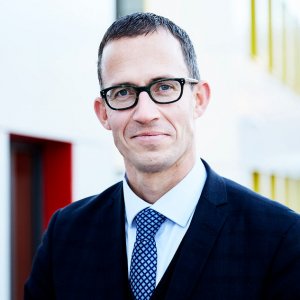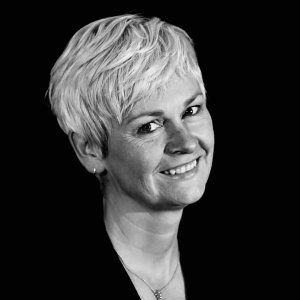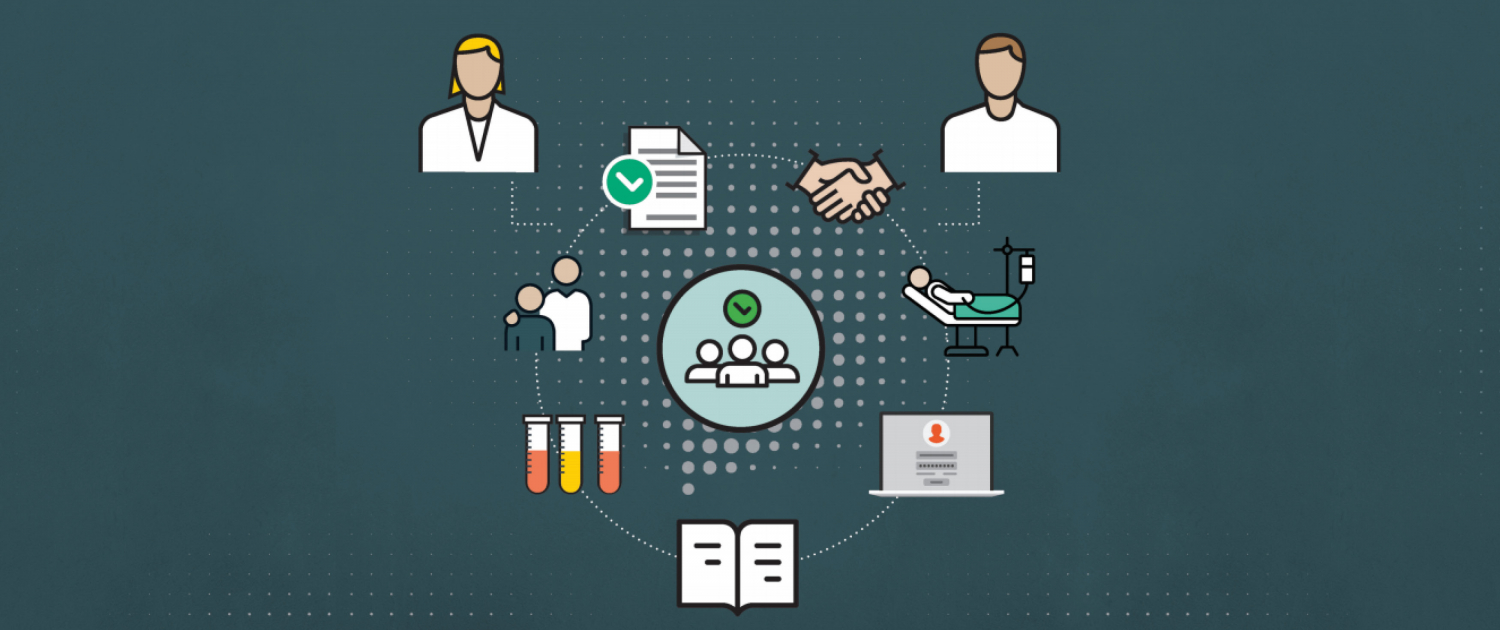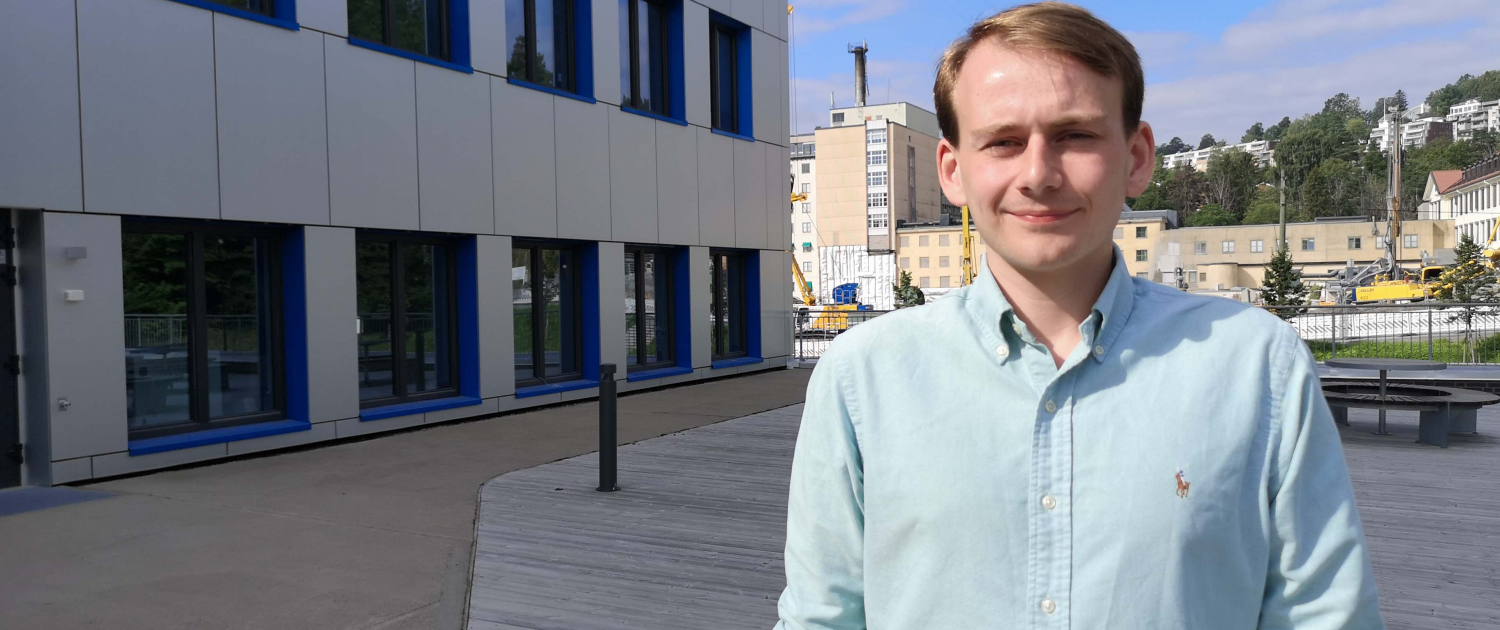
This article was first published in Norwegian on our school collaboration website. Read it here.
Through the collaboration between Oslo Cancer Cluster and Ullern Upper Secondary School, former Ullern-student Eivind Lysheim has found his way in life – both academically and professionally. “I am very thankful for this,” said Eivind.
“I want to thank you for helping me find a summer job with Kongsberg Beam Technology (KBT). I appreciate that you took the time to help, despite problems caused by the pandemic.
“I worked for KBT last summer and felt right at home. I have since then worked a few hours every week with the company, next to my studies. A couple of days ago, I signed a permanent contract with KBT and I will begin to work in the company’s prospective office at Oslo Cancer Cluster Incubator from the summer 2021.”
This is the e-mail that Eivind Lysheim sent to Bente Prestegård in Oslo Cancer Cluster at the end of November 2020.
A guiding placement
Eivind Lysheim has half a year left of his degree at the Norwegian University for Science and Technology (NTNU), where he is working intensely to finalise his master’s in Medical Physics.
Eivind chose this degree after participating in a one-week placement at the Department for Medical Physics at the Radium Hospital in March 2016. The placement is an annual option for students at Ullern Upper Secondary School, as a part of the opportunities the students receive through the collaboration between Oslo Cancer Cluster and Ullern Upper Secondary School.
Eivind attended Ullern between 2013 and 2016 and specialised in different science subjects.
“I did not know exactly what do to after graduation. I liked science but didn’t know what I could do with it. When I participated in the placement, everything fell into place and I changed my first choice from Economics to Medical Physics at NTNU,” said Eivind.
Eivind said that choosing his degree was a direct consequence of the placement.
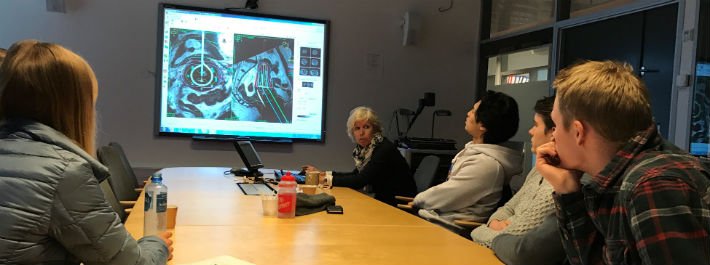
The physicist Taran Hellebust Paulsen explains to Kristian Novsett Borgen, Aurora Opheim Sauar, Edvard Dybevold Hesle, Alexander Lu, Trym Overrein Lunde and Tuva Askman Nærby about the use of radiation in cancer therapy. Photo: Elisabeth Kirkeng Andersen
“It was an incredibly exciting placement and I was very fascinated by the researchers and clinicians that use radiation to treat cancer, even though radiation is deadly. This duality awakened something in me,” said Eivind.
He also found the people responsible for the placement genuinely enthusiastic about teaching their subjects to him and his co-students. They took time out of their busy schedules and were excellent communicators.
Summer job in a relevant company
Half a year after the placement, Eivind was in Trondheim at NTNU studying Medical Physics. This was the same degree that Taran Paulsen Hellebust, associate professor at the Department for Medical Physics and responsible for the placement that Eivind participated in, had studied.
In January 2020, Eivind sent an e-mail to Bente Prestegård. Bente is project manager for the collaboration between Oslo Cancer Cluster and Ullern Upper Secondary School.
“Eivind sent me a very nice e-mail, in which he told me he was a former student at Ullern and that he had participated in the placement with Taran. He wondered if I knew of any relevant summer jobs,” said Bente.
Bente asked around in her network among start-up companies in Oslo Cancer Cluster Incubator: were there any companies that needed Eivind’s skill set?
“Bjørn Klem, the manager of the Incubator, suggested the company Kongsberg Beam Technology that he was actively advising. I connected Per Håvard Kleven, the general manager at the time, with Eivind and, as a result, he got a summer job there during 2020,” said Bente.
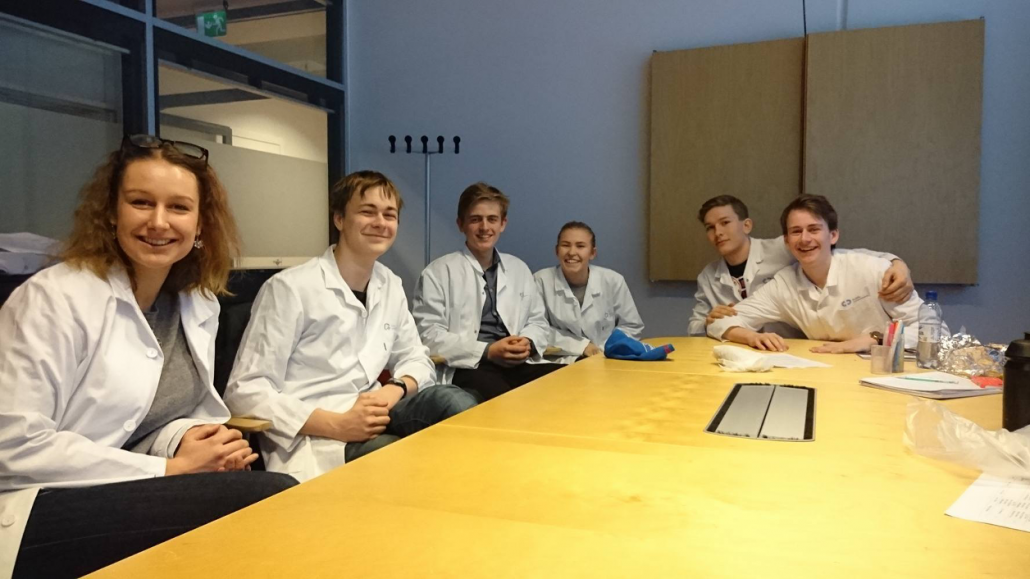
Eivind and his co-students from Ullern at a placement at the Department for Radiobiology at the Radium Hospital in 2016. Photo: Elisabeth Kirkeng Andersen
Only positive references
Kongsberg Beam Technology is a member of Oslo Cancer Cluster Incubator and develops technologies to improve the accuracy of proton therapy machines.
“The core of the project is to achieve industrial precision in cancer radiation therapy, to avoid damaging healthy tissue. By achieving higher precision, the cancer cells can be radiated with more powerful doses than today,” said Per Håvard Kleven, founder of Kongsberg Beam Technology.
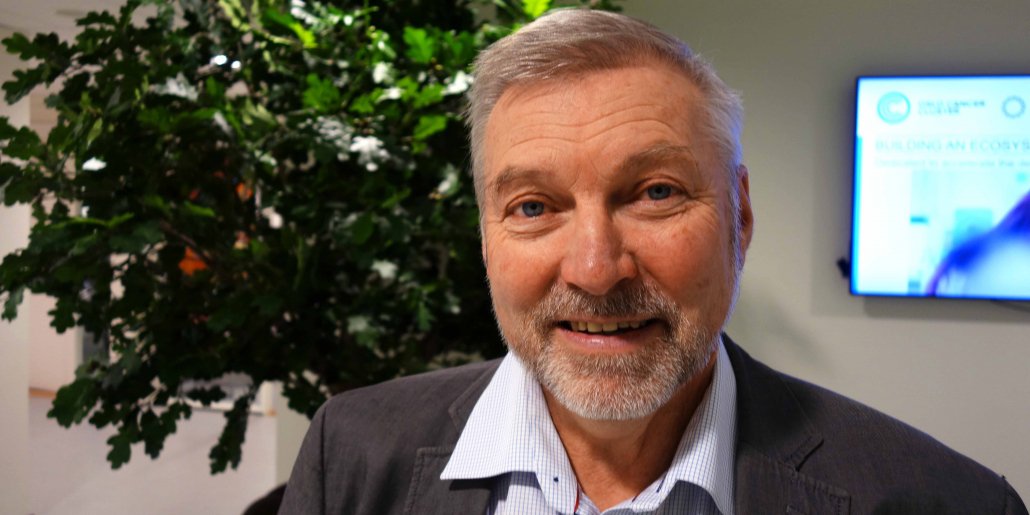
Per Håvard Kleven, serial entrepreneur and founder of Kongsberg Beam Technology. Photo: Oslo Cancer Cluster.
Per Håvard is a serial entrepreneur and started the project that Kongsberg Beam Technology has spun out from in 2016. The company was officially founded in 2018.
In the summer of 2020, Eivind worked with different types of research for the company and it went so well that he continued in a 20 per cent position next to his studies during the fall. In November, Eivind was offered a permanent job beginning in August 2021.
“I am thrilled about this job. The assignments are exciting, and the colleagues are nice, so I am very happy and thankful for the opportunity. It was a good match with Kongsberg Beam Technology, and I feel that I am also contributing to a relevant part of the project. It is fun,” said Eivind.
Per Håvard only has words of praise for the new employee.
“Eivind is endlessly interested in the project and what we do. He receives tasks from a project manager. Many of the assignments are about researching different things. I receive great feedback on his work and efforts,” said Per Håvard.
New offices in the incubator
Kongsberg Beam Technology is in a research and development phase, the goal is to develop finished control systems for proton machines during the next years, in order to transition to a commercial phase by 2025. That is when Kongsberg Beam Technology will sell the systems globally.
“If we succeed with this, it will mean a revolution in radiation treatment of cancer patients.”
“We are in the lucky position that no one else globally is doing exactly what we are doing. If everything goes according to plan, we will be in a unique position on the market in only a few years,” said Per Håvard.
Per Håvard has recently hired Kerstin Jakobsson as new CEO of the company. She has long experience from radiobiology in Sweden, where this is an established commercial field, which it hasn’t become in Norway – yet.
“From the fall of 2021, Kerstin and Eivind will be in Oslo Cancer Cluster Incubator, while I will be leading the Kongsberg-side of things in the Incubator Kongsberg Innovation,” said Per Håvard.
He is very impressed by the collaboration between Oslo Cancer Cluster and Ullern Upper Secondary School and says this is important to secure the recruitment of highly competent employees to a knowledge-intensive industry in Norway.
“It is very smart and positive that they have managed to build a collaboration between the school, the hospital, Oslo Cancer Cluster and the Incubator, where there is such a clear common goal on many levels,” said Per Håvard.
A unique network
Eivind says that the degree he chose was because of the placement. Now, the permanent position he has secured before finishing his master is very important to him.
“I realised in Trondheim that I had a network through Oslo Cancer Cluster that opened doors for me.”
“This made it easier for me, compared to my fellow students, to find a relevant summer job. I knew who to turn to,” said Eivind.
Bente is extremely happy to hear that Eivind, starting this fall, will be one of the many employees that share a workplace with her in Oslo Cancer Cluster Incubator.
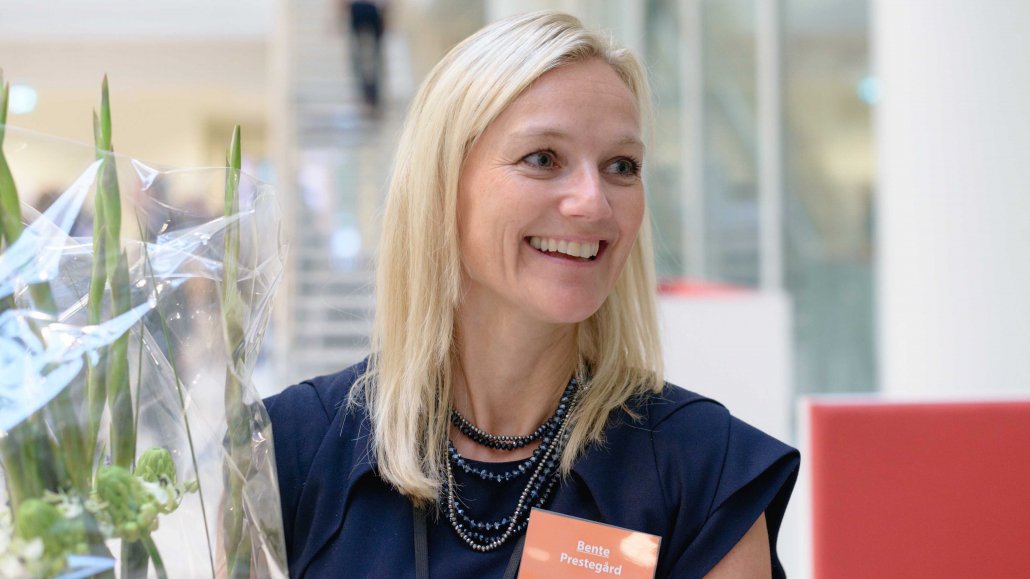
Bente is project manager in Oslo Cancer Cluster and responsible for the collaboration with the school on behalf of the cluster. Photo: Gunnar Kopperud
“This is a really nice story that fully shows what we wish to achieve with the school collaboration. It should inspire further education and we wish to recruit for our members, both the companies and academic institutions,” said Bente.
“This fall, corona is hopefully under control so that I can meet Eivind in the incubator. It is really a cross-disciplinary environment, which is truly inspiring to work in. It will be fun to have him here,” said Bente.
- Eivind was interviewed by Oslo Cancer Cluster in August 2020 about his summer job with Kongsberg Beam Technology – read the interview here.
About Kongsberg Beam Technology
- Founded and led by serial entrepreneur Per Håvard Kleven, who has had a long career in the Kongsberg industry
- Owned by Oslo Cancer Cluster Incubator, Kongsberg Innovation, VIS Innovation and 18 private owners. Partner with Semcon Norway on development.
- Kongsberg Beam Technology will, by using precision technology from industrial control systems, make proton therapy to treat cancer tumours more precise and with fewer side effects.
- Have developed a system for this called MAMA-K, which is short for Multi-Array Multi-Axis Cancer Combat Machine.
- In 2020, the company received NOK 22,7 million in support from the Norwegian Research Council to develop the system.
- The plan is to work with the development of the technology until 2025 and then transition to patient treatment.
- The company has received support from Oslo Cancer Cluster Incubator for business development and obtaining capital.
Read articles about the company




